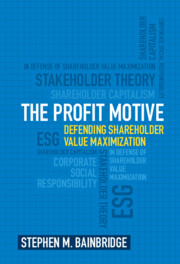Book contents
- The Profit Motive
- The Profit Motive
- Copyright page
- Dedication
- Contents
- Acknowledgments
- Editorial Note
- Introduction
- Part I The Law
- 1 The Battle of River Rouge
- 2 Fireplug Funding for Princeton
- 3 Why Didn’t the Cubs Have to Play Night Baseball?
- 4 Defending Dodge
- 5 To Make Stakeholder Capitalism the Rule, You Would Have to Change Most of Corporate Law
- 6 What about the Benefit Corporation?
- Part II The Merits
- Conclusion
- Notes
- Index
4 - Defending Dodge
from Part I - The Law
Published online by Cambridge University Press: 02 February 2023
- The Profit Motive
- The Profit Motive
- Copyright page
- Dedication
- Contents
- Acknowledgments
- Editorial Note
- Introduction
- Part I The Law
- 1 The Battle of River Rouge
- 2 Fireplug Funding for Princeton
- 3 Why Didn’t the Cubs Have to Play Night Baseball?
- 4 Defending Dodge
- 5 To Make Stakeholder Capitalism the Rule, You Would Have to Change Most of Corporate Law
- 6 What about the Benefit Corporation?
- Part II The Merits
- Conclusion
- Notes
- Index
Summary
One of the key claims of advocates of stakeholder capitalism, especially those in the legal academy, is that the foundational case – Dodge v. Ford Motor Co. – was not good law when it was first written, the key part of the decision, is mere dicta, and subsequent legal developments have undercut whatever validity the decision may have had at one time. All of these claims are demonstrably false. As Chief Justice Leo Strine put it, those who claim that shareholder value maximization is not the law are pretending.
- Type
- Chapter
- Information
- The Profit MotiveDefending Shareholder Value Maximization, pp. 50 - 72Publisher: Cambridge University PressPrint publication year: 2023

